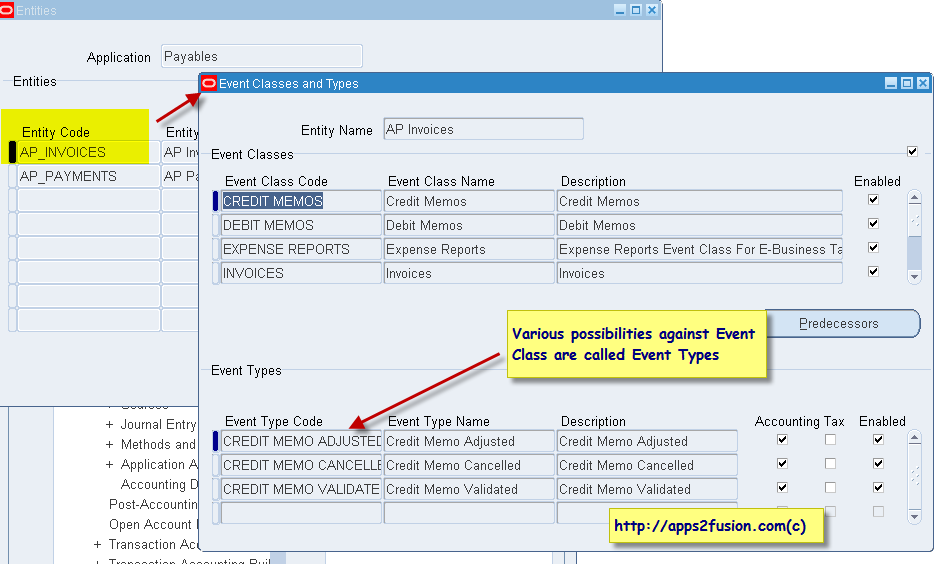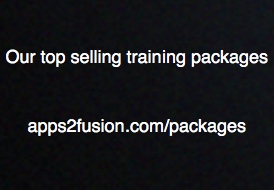In this article you understand some of the basics fabrics/terminology used in SLA, i.e. Entities, Event Classes and Event Types.  It is important for you to understand the variables within SLA engine which influence whether an accounting entry needs to be generated for a specific event within subledger like Payables or Receivables. For example in Procurement, there may be a need to generate accounting whenever a Purchase Order is encumbered. In case of SLA, the activity of "Encumbrance" against a Purchase Order is known as Event Type.
It is important for you to understand the variables within SLA engine which influence whether an accounting entry needs to be generated for a specific event within subledger like Payables or Receivables. For example in Procurement, there may be a need to generate accounting whenever a Purchase Order is encumbered. In case of SLA, the activity of "Encumbrance" against a Purchase Order is known as Event Type.
Likewise when a Payables Invoice is Validated, then you may want to create an accounting entry. In this case the "Invoice Validation" is an "Event Type". And your accounting rules for Invoice Validation will be attached against this specific "Event Type".
For Payables, an INVOICE transaction and a PAYMENT transactions are known as Entities within SLA.
Entities can be subdivided into various "Event Classes", for example Credit Memo, Debit Memo, Expense Reports, Invoices etc.
Further to this, against the Event classes we define Event Types, for example, whenever your Invoice is validated or cancelled or adjusted, you may want some specific accounts in the General Ledger to be impacted. Event types are therefore the types/list of events against transactions which you wish to account for in General Ledger.
Navigator - Payables (USA)- Functions-Subledger Accounting Setup - Subledger Applications
 It is important for you to understand the variables within SLA engine which influence whether an accounting entry needs to be generated for a specific event within subledger like Payables or Receivables. For example in Procurement, there may be a need to generate accounting whenever a Purchase Order is encumbered. In case of SLA, the activity of "Encumbrance" against a Purchase Order is known as Event Type.
It is important for you to understand the variables within SLA engine which influence whether an accounting entry needs to be generated for a specific event within subledger like Payables or Receivables. For example in Procurement, there may be a need to generate accounting whenever a Purchase Order is encumbered. In case of SLA, the activity of "Encumbrance" against a Purchase Order is known as Event Type. Likewise when a Payables Invoice is Validated, then you may want to create an accounting entry. In this case the "Invoice Validation" is an "Event Type". And your accounting rules for Invoice Validation will be attached against this specific "Event Type".
For Payables, an INVOICE transaction and a PAYMENT transactions are known as Entities within SLA.
Entities can be subdivided into various "Event Classes", for example Credit Memo, Debit Memo, Expense Reports, Invoices etc.
Further to this, against the Event classes we define Event Types, for example, whenever your Invoice is validated or cancelled or adjusted, you may want some specific accounts in the General Ledger to be impacted. Event types are therefore the types/list of events against transactions which you wish to account for in General Ledger.
Navigator - Payables (USA)- Functions-Subledger Accounting Setup - Subledger Applications
Select Event Model

Each entity is identified by unique identifier or primary key from the underlying tables.
Each entity is identified by unique identifier or primary key from the underlying tables.





Comments
In 11i, we need to rely on the reference columns and figure it out how to map this back to a PO or Invoice for instance. Now with R12, using the proper XLA tables, it is easier to drilldown.
Kee p teaching us Anil! You are great
All of your documents are excellent. Basics are taught well.
Many thanks for your initiatives to help others.
Keep posting.
Best Regards,
Arun Reddy D.
When I went for an interview they asked me some question I told them just type Anil Passi they were all started laughing
RSS feed for comments to this post